The chef persuading French foodies to love British pies
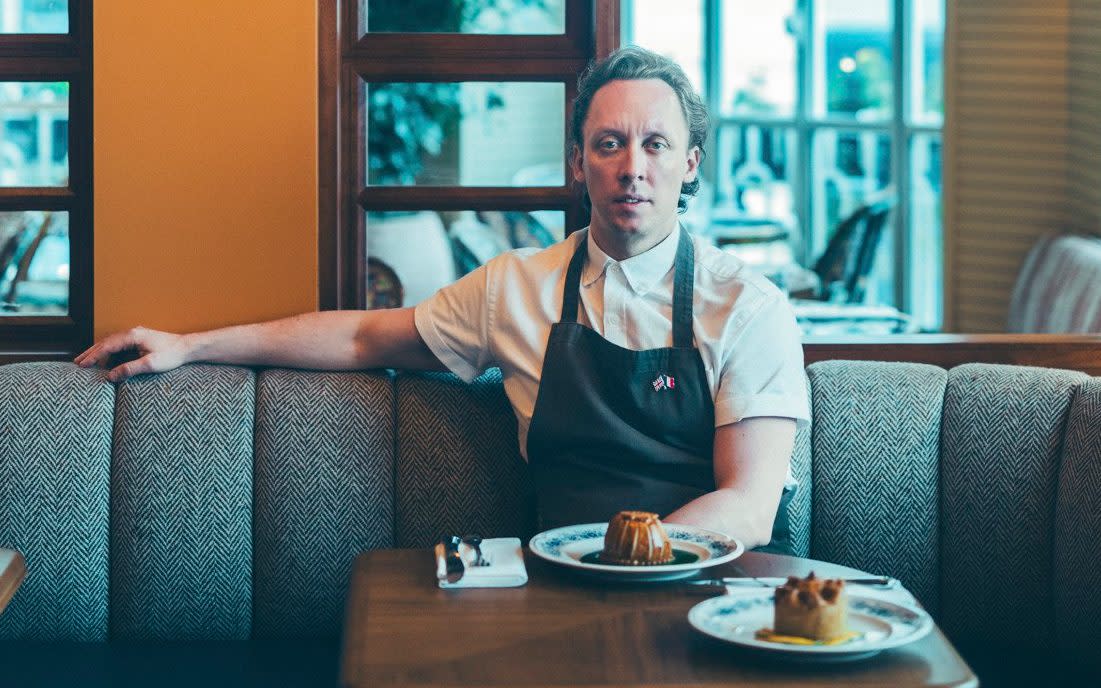
At the launch party for Public House, the pie master Calum Franklin’s new British brasserie in Paris, most of the guests were French and some of the canapés required a bit of explanation.
‘C’est quoi, chef?’ asked the man in front of me, surveying a selection of pastries laid out on a table. ‘C’est un sausage roll,’ came the reply.
He tried a slice, a little warily, then took another, evidently satisfied. Waiters came squeezing through the crowd bearing trays of miniature fish and chips, which were gone in an instant, and slivers of Scotch egg, which were gone more slowly.
Still, the general atmosphere was excitable. The guests were pleased to be there and so were the hosts. ‘It’s good to have the British community in Paris supported by a place like this opening,’ said Theo Rycroft, the deputy head of mission at the British embassy here. ‘It’s fair to say that British cuisine isn’t that prevalent in Paris, but it is gaining a bit of momentum. Traditionally the culinary exchange has been the other way, but we are fighting back.’
Until recently the French would have seen the idea of a serious British restaurant in Paris as a joke. But a steady drip of tourists eating out in London and being surprised by what they have found – including the British cooking at Core by Clare Smyth, which has been awarded three Michelin stars – has bolstered the UK’s reputation. Parisian diners are more receptive to the idea that dishes from across La Manche might have advanced to the point of edibility.
‘Paris is in a moment where there is serious hunger for different cuisines, and the view of British food has changed,’ Franklin says the next morning, sitting at a table on the ground floor of Public House, while the staff prepare for lunch service.
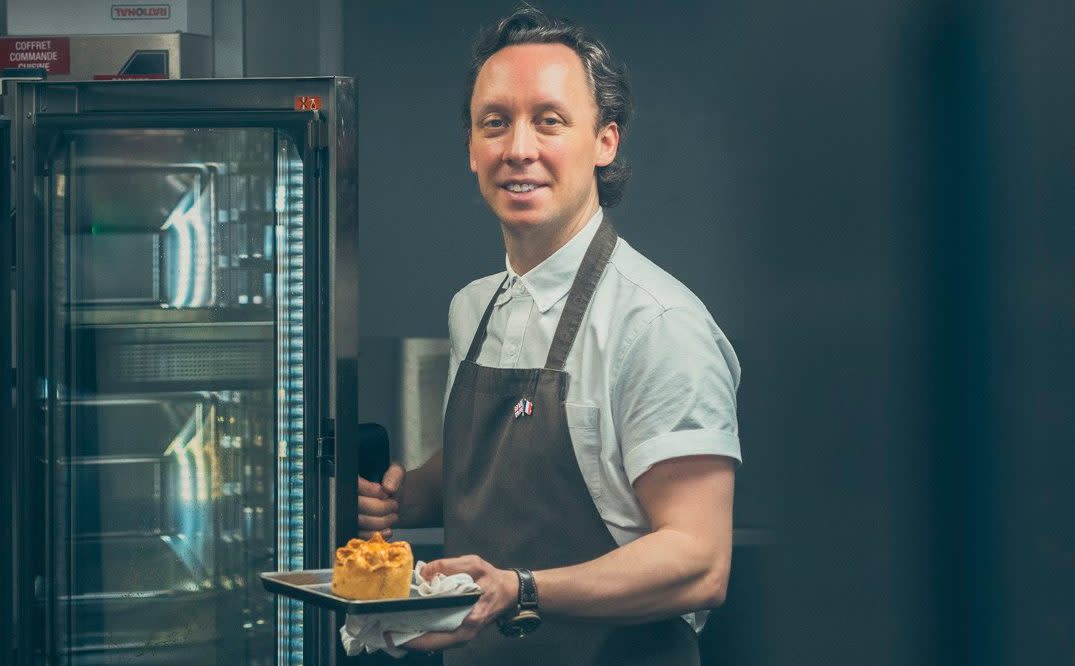
The restaurant, set over three floors in the fancy second arrondissement, has been open for two weeks and word of mouth is already working its magic: from noon on the dot hungry diners stream through its doors. Franklin, a boyish 41 with his hair swept back, makes for a passionate and engaging ambassador, an antidote to the sweary Ramsay or nerdy Blumenthal archetypes.
The idea came from a meeting with his backers at Groupe Bertrand, a leading French restaurant group, who saw in Franklin someone with the clout to bring something new to the city. ‘In Paris I see, now, brutally authentic Thai restaurants serving minced raw pork with bird’s-eye chilli that have queues down the street. There’s this hunger for authenticity that made me more secure about what we were going to do,’ he says.
Franklin’s menu offers a tour of British favourites. Starters include whitebait, cured salmon, a ploughman’s platter for two. Then there’s the famous Scotch egg, in which a runny egg comes within a sarcophagus of boudin noir. ‘Scotch egg is something new to Parisians,’ he says. ‘But that’s one of the dishes that’s grounded in the idea of a British restaurant in Paris, celebrating produce but cooked using a traditional technique.’
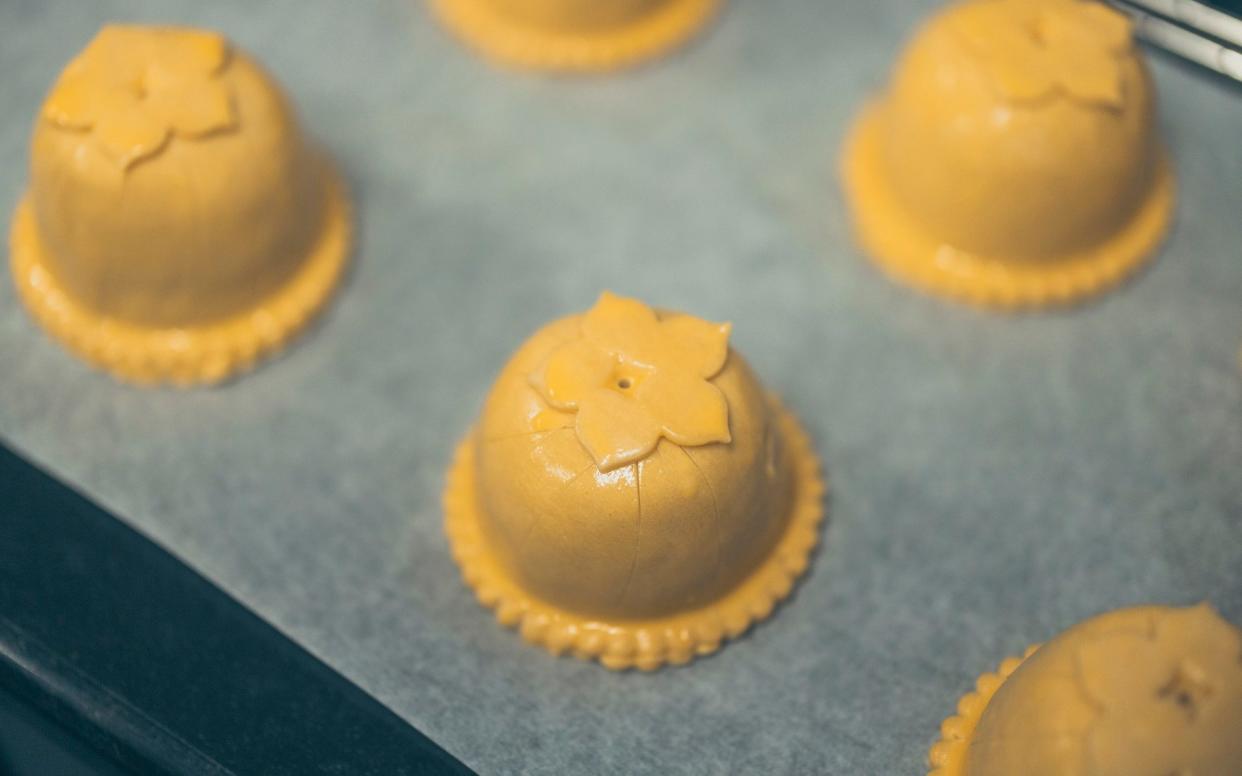
Even in the UK, the Scotch egg was much abused before its recent revival, for which Franklin can take his share of the credit. ‘It had become the kind of Alan Partridge, service station, hard-boiled grey egg,’ Franklin says. ‘It has taken a while to change that view. But one of the things I hear most often from guests now is that they love the Scotch egg. That means a lot to me.’
Main courses include a burger, a steak, and fish and chips – for the batter, they have removed the gluten from the flour, creating a beautifully light, almost tempura-style casing for the fish. The pies are mostly a greatest hits from Holborn Dining Room (Franklin’s former home within the Rosewood hotel in London), given a local twist here and there. For the lid of the chicken and tarragon pie, Franklin and his pie lieutenant, a 14th-generation pâtissier called Clément Gellée, have replicated a baroque architectural detail they saw at the Palais Garnier. There’s also a dauphinoise potato pie, which one Frenchwoman I speak to says reminds her of her childhood. Franklin gets that a lot.
‘At the Holborn Dining Room I found that if I put a pie on [the menu], everyone would have the pie. Everyone would be sat there discussing stressful multimillion-pound business deals, but they were eating something that reminds them of childhood. You can make pies look very beautiful and elegant and constructed, but psychologically it is family-table food. It gives you the feeling you’re sat with your mum. Maybe. That’s the philosophy of the pie.’ He laughs.
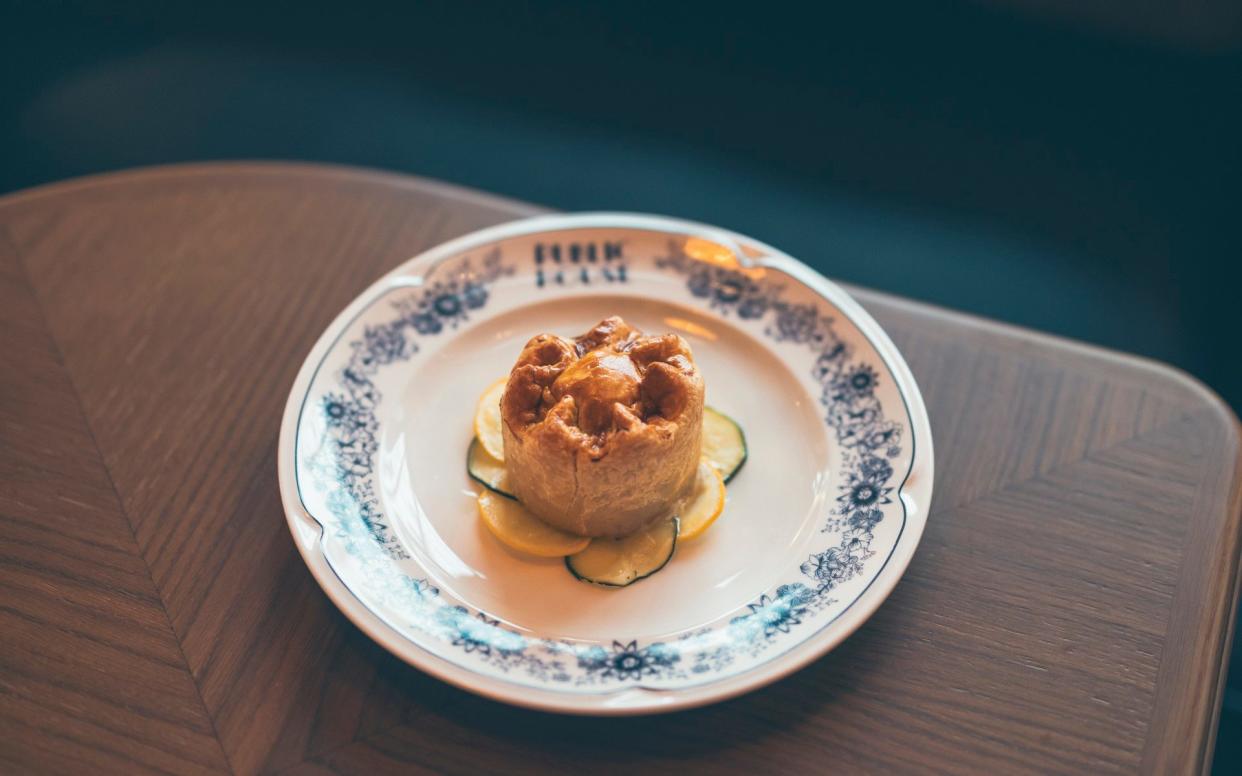
Everything is cooked using French produce. Franklin had hoped to use one or two British ingredients, but the extra red tape and costs since Brexit have meant it would not be cost-effective. ‘It shouldn’t be that hard to bring British produce out of Britain,’ he says. ‘But it is.’
While he has not struggled to find what he needs for the most part, one or two things have proved elusive. ‘Pickled walnuts just don’t exist culturally in France,’ he says. ‘We found one guy in the south. He thought it was unusual that someone was interested. Then we bought his entire year’s supply off him. He’s really happy.’
Public House is not quite the first attempt at British food in Paris. There is L’Entente, a brasserie also in the second arrondissement, and a few gimmicky theme-pubs. There have been occasional endeavours over the years to reveal the glory of bangers and mash or fish and chips. Nothing has really stuck; many French people remain ambivalent, at best, on the subject of British cooking.
But there has been nothing with the scale or ambition of Public House.
It occupies an enormous building on the site of an old nightclub in Opéra, across the road from the Olympia concert venue. The interior has been designed to marry the informality of a pub with the all-day elegance of a brasserie. In the basement is a roomy bar; upstairs there is a games room with darts and chess. As with any brasserie, the idea is that it’s somewhere you could come several times a week, in
different moods and with different groups. ‘We all thought it would be a good idea to open a massive restaurant,’ Franklin says, laughing. ‘The challenge was exciting. I like being up against the wall.’
If this is physically the biggest British restaurant that Paris has seen, Franklin also has more prestige than any chef to attempt it before him. The nation could not ask for a better emissary. Over the past decade, he has established himself as Britain’s Pie King.
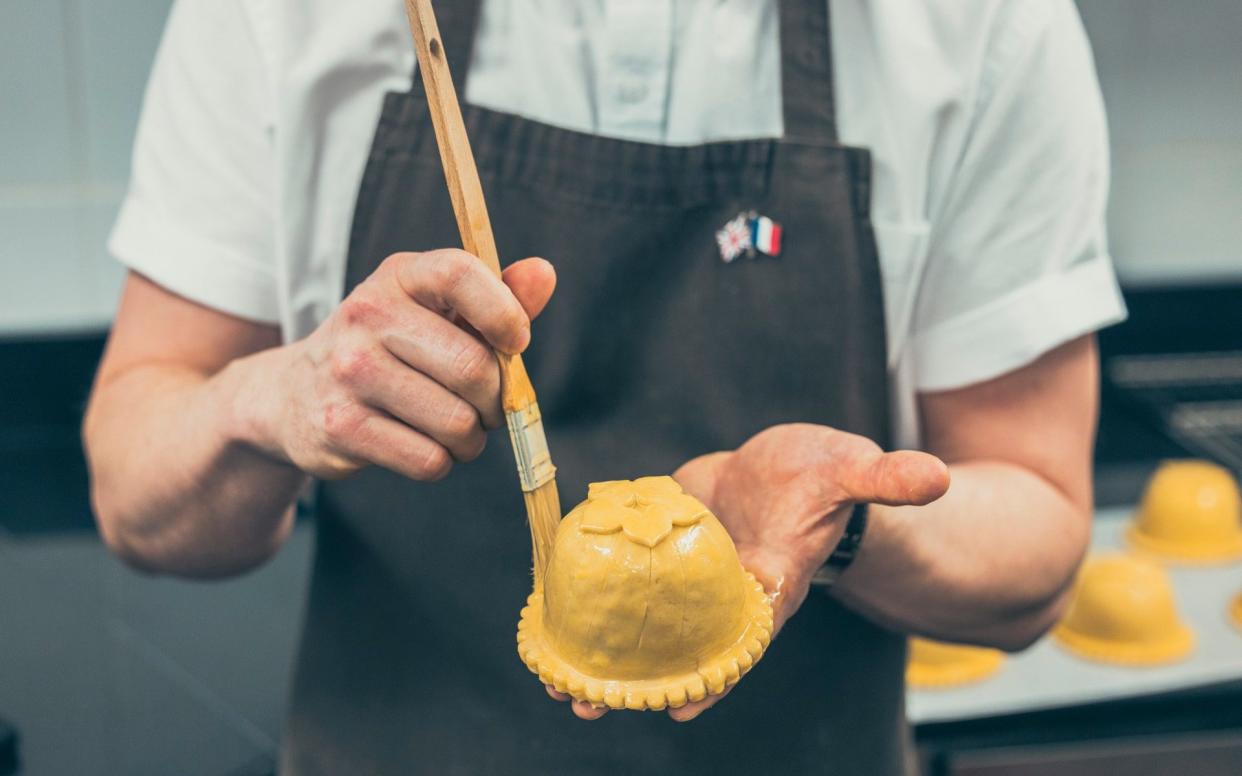
Since it opened in 2014, Holborn Dining Room has become an enduring home for elegant British cooking. The menu is focused on brilliant pies – there is a highly photogenic Pie Room off one end of the space, clad in antique copper moulds and pie-making ephemera – which often draw on archival research dating back hundreds of years. Off the back of it Franklin wrote an award-winning book, The Pie Room, full of appetising recipes. He had plenty of offers to do other hotel restaurants, or something else in London. Safe, comfortable, slightly dull.
‘Everything was good [at Holborn],’ he says. ‘It was settled, running smoothly. The team was just amazing. I needed something different. I’ve been cooking in London for 23 years. It was too safe.’ In Paris he has found perhaps the toughest gig any British restaurateur could come up with.
‘I’d always regretted not working in Paris when I was young,’ he says. ‘In my 20s a lot of my friends were coming to the city and I think I was scared because of not having the language, but they didn’t either.
‘We’re just trying to do our little bit to raise the awareness of British food; put our little pie flag up.’
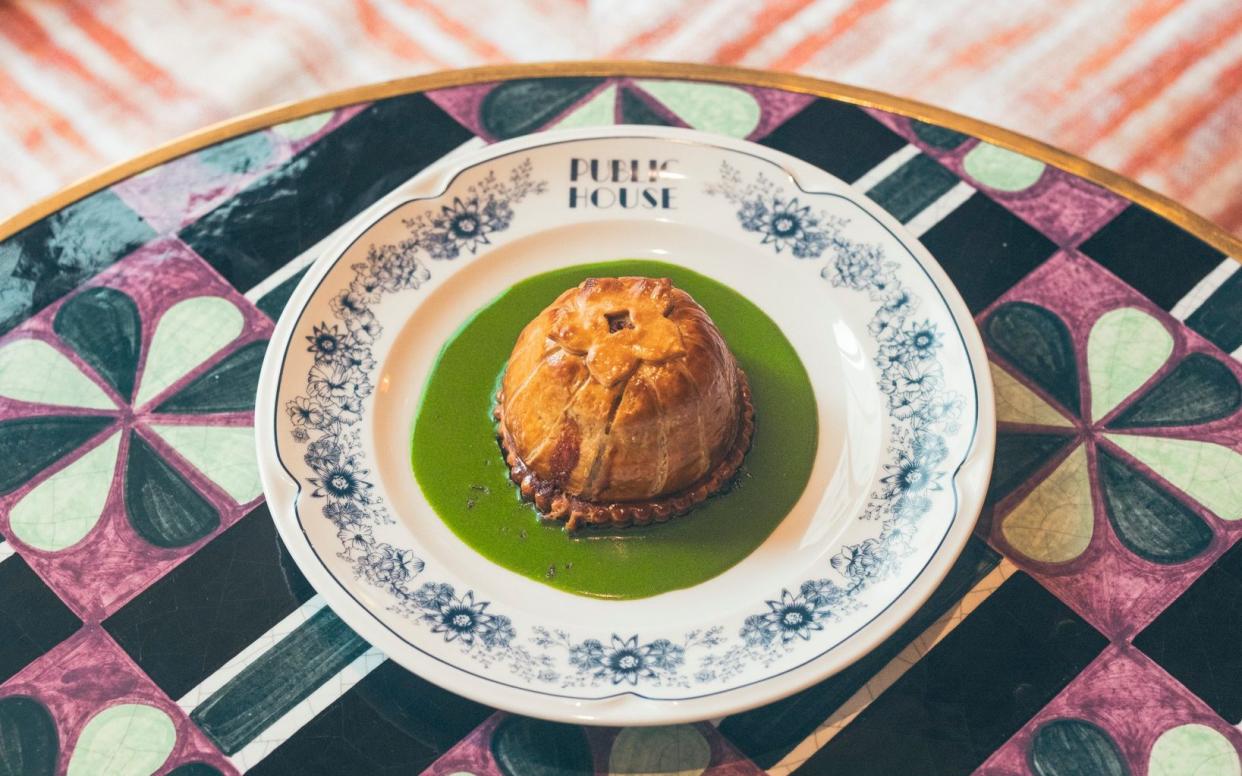
Franklin did not come directly to pies. He grew up in south-east London, the middle of three boys. His older brother is a lawyer, his younger brother works in tech development. ‘Both of them were very academic,’ he says. ‘I wasn’t at all. I was causing mayhem, getting into trouble. I think part of that was not having any clue of what I wanted to do. All the teachers were telling me to go off and get a degree. But the thought of an office job terrified me.’
A work-experience placement at a talent agency in Soho, where he met a young and eager Hugh Jackman, opened Franklin’s eyes to the more creative side of the city. ‘I’d never experienced that part of London before,’ he says. ‘Hospitality opened a way of living in that part of London.’
At 16, he took a job as a pot-washer in a local restaurant, Prima Donnas. ‘On the first day I came home after being abused by the chefs and I told my older brother, “I know what I want to do with my career.” He was jealous because I was so clear in my vision. But I had found it. Not pot-washing, but that world.’
He came up through Chapter One, Michelin-starred at the time, The Ivy, Aurora at the Andaz hotel, Indigo at the One Aldwych hotel and finally Roast, in Borough Market, before he moved to Holborn Dining Room.
‘Kitchens were different from how they are now,’ he says. ‘They were physically very tough. There was lots of pot-throwing and verbal abuse. If you’ve done two weeks of 16- or 17-hour days ducking and diving flying pans, emotionally that’s quite hard. Quite often a chef will say, “You’re not coming back.” You have to have the capacity to say, “Yes I will, I’ll prove you wrong.” Part of my personality is that I would always have that in my head: you’ll see, I’ll be back tomorrow.’
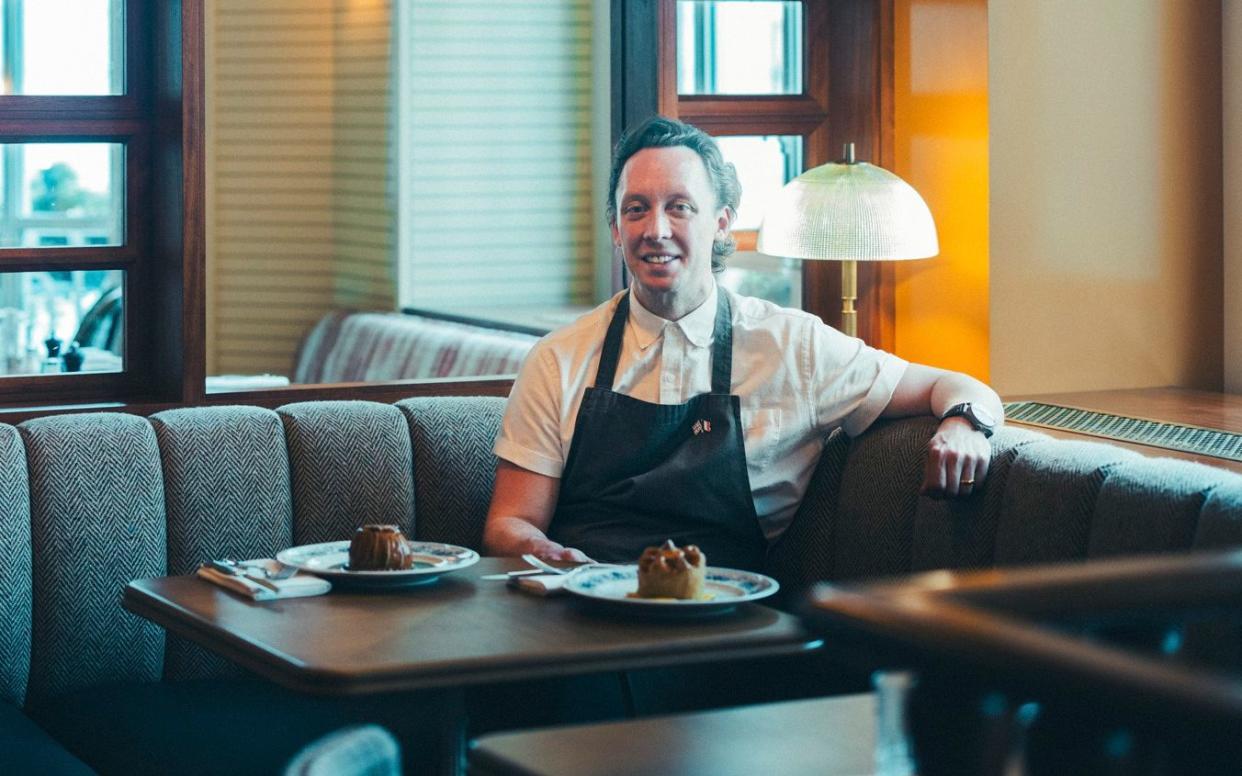
All the same, eventually he cracked. ‘It broke me mentally a couple of times,’ he says. ‘There’s only so much you can take. When I was 29 I went into rehab for alcohol addiction, which was a coping mechanism for me. I’ve been sober since. That was kept hidden by the way the industry was run. I was running big kitchens in London while a functioning alcoholic. I was fully physically addicted. I was dying. Fortunately I managed to deal with it quite early in life.’
He credits his family and his then-boss, Tony Fleming, with getting him sober. ‘My God, people were very patient,’ he says. ‘When you’re in it, you’re the only one who doesn’t want [sobriety] to happen. It’s something that had to happen in my life. After that I could put my proper focus on to what I wanted to do. Maybe I was lost before that, because there was always constant distraction. It’s difficult to describe, but it’s just such a massive block of distraction in your life.’
Even after sobering up, he went on to work himself so hard at Holborn Dining Room that he reached a breaking point again. ‘I felt my importance in the business was so much that I couldn’t see a doctor. I collapsed in the street in Fitzrovia one night and I had an abscess in my lower intestine. I was out of the kitchen for a month recovering, and in that time we had three restaurant reviews and all of them were amazing. That taught me a lot about trusting people with responsibility. Everyone flourished when I wasn’t there. It changed my view on how to run restaurants. It was humbling.’
He doesn’t stand for bullying in his own kitchens. ‘I don’t want people to work in that environment,’ he says. ‘We lost lots of people who were talented, who if they had been treated decently would have enriched the industry and been huge successes. People realised it’s not cool to be seen as the toughest. Now it’s more respectable to be known for running fair kitchens.’ The staff at Public House are all French, except for one young man from Tottenham.
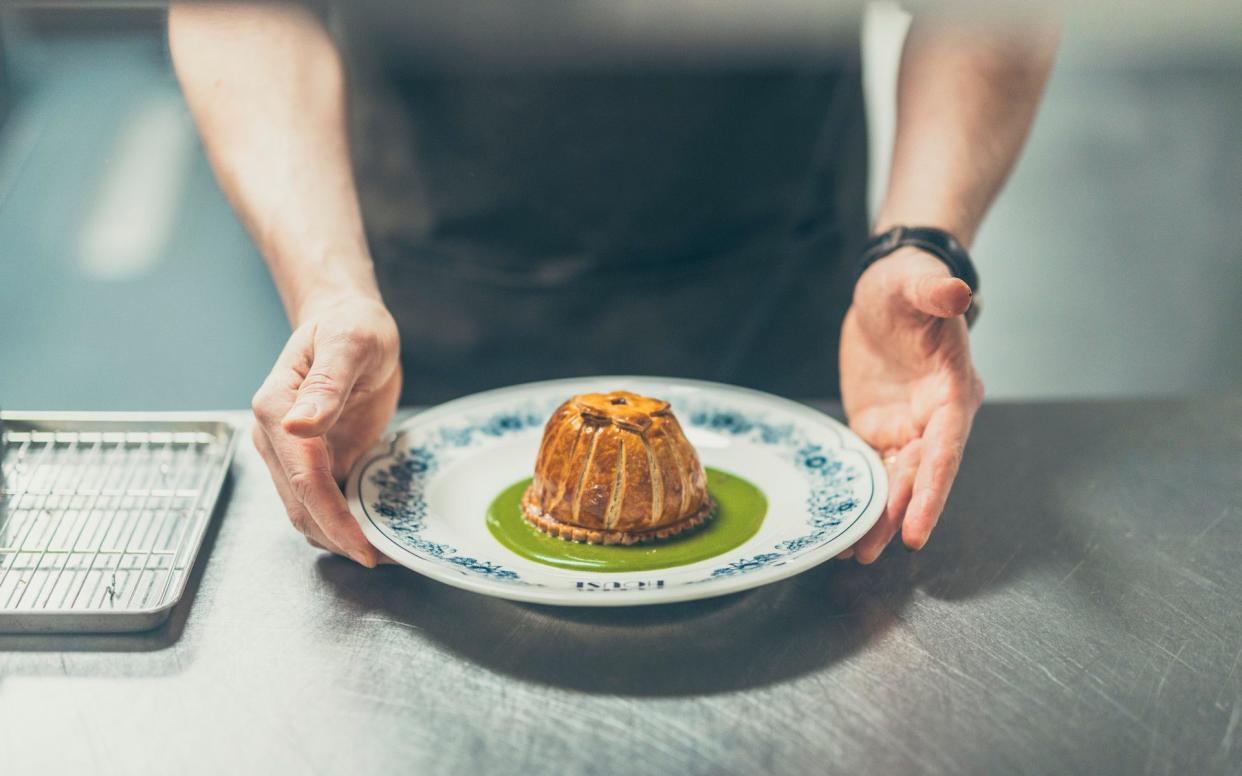
Franklin’s brothers were there for the launch party, along with their mother, Lindsay, and his wife, Shenali, a speech and language therapist. ‘My mum’s always been quite grounding with all of us, but she did say she was very proud of me, which was sweet of her,’ he says. ‘Although she was quite emotional, she’d had about 12 glasses of Champagne.’ His father, Fred, was not there. ‘He died around 15 years ago, but he would have liked this. I’ll always regret that he never got to see any of that stuff. He liked pies.’
For now, one titan of British savoury pastries – and Franklin’s past work – is conspicuous by its absence from Public House: beef Wellington. Franklin says he will put it on the menu, but only when the time is right. ‘That is one of the British dishes I’m proudest of being associated with and proudest of celebrating… But before we serve it I want to make sure it’s going to be as good as it can be. It is my favourite thing to cook. I think it will be big here.’
The question is: will he have to change the name? In Anglo-French relations, some things are thicker than pastry.


